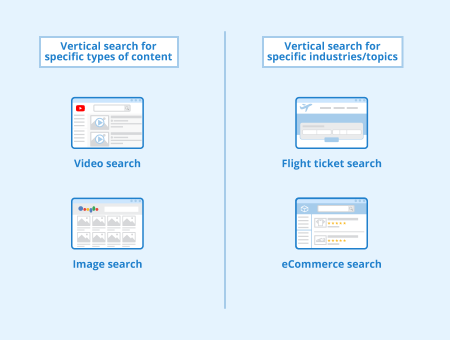Vertical Search
Contents
Vertical search – Definition & explanation

Vertical search includes all searches on vertical search engines, which are search engines that focus on one thing like a type of content, an industry, or a sub-industry.
Vertical search engines commonly focus on certain topics/industries, like flights/holidays, jobs, or real estate. By only providing relevant results to people looking for flights/holidays, jobs, and real estate respectively, this type of search engine can offer an improved user experience when compared to large web search engines that focus on the entire web.
There are also vertical search engines that focus on certain content types, like video content, research articles, or images. This allows users to search solely for specific content, improving the speed and efficiency of the search process.
YouTube is an example of a vertical search engine focusing solely on video content:

The advantages of vertical search
There are a few advantages of vertical search that improve the user experience compared to large internet-wide search engines. Some of these advantages are:
More targeted search results
By focusing on a specific industry or content type, vertical search provides more targeted search results. This provides more focus and improves the accessibility to relevant information.
Faster & more efficient
By only displaying relevant content, vertical search saves users time browsing through irrelevant content types or content on irrelevant topics.
Improved information
By focusing on a specific type of content or a certain industry, the information provided in vertical search tends to be superior to all-inclusive search engines.
Challenges and Limitations
While vertical search engines offer a more focused and refined search experience, they are not without their challenges and limitations. One of the primary challenges is data curation. Unlike general search engines that attempt to index the entire web, using search engine crawlers to discover new content, vertical search engines must curate and maintain a database of industry-specific information, which can be both resource-intensive and difficult to achieve.
Another significant challenge is user adoption. Users are used to using large, general search engines for their queries and this makes it difficult for vertical search engines to compete. With fewer users, the amount they can invest into improving their search algorithms is significantly less than major, general search engines like Google and Bing.
Examples of vertical search engines
- YouTube – A vertical search engine owned by Google that focuses exclusively on video content.
- Google Images – One of Google’s many vertical search engines that focuses on Images. Other vertical search engines offered by Google include Google News, Google Maps, Google Videos, Google Shopping, and various others.
- Skyscanner – A meta search engine that focuses exclusively on flights, hotels, and car hire.
- Yelp – A company/review directory that functions based on a vertical search engine focusing exclusively on businesses.
- Amazon – An eCommerce store with an extensive search feature that focuses exclusively on products listed on its platform.

An image of Skyscanner - a vertical search engine in the travel industry.
The future of vertical search
Looking ahead, the future of vertical search is set to be shaped by several key trends. One of the most significant is the integration of artificial intelligence (AI) and machine learning, which is becoming less expensive as more models are made available to a wider audience. These technologies have the potential to dramatically improve the accuracy and relevance of search results and can make it easier for vertical search engines to compete with larger competitors.
Another trend is the increasing personalization of SERPs. As vertical search engines gather more data on their users, they can tailor the search experience to individual preferences and needs, making it even more efficient and user-friendly. As they develop a better foundation of data to build their search results on and AI technologies become more widely available, the niche advantage that vertical search engines have over broader, more general search engines is likely to widen.
Relevance to SEO
Over the years, vertical search engines have grown immensely in popularity. Although Google is still the dominant web search engine, various vertical search engines are becoming more important for website marketing strategies.
The increased adoption of vertical search has increased the importance of things like video SEO and image SEO. With the increased use of websites like Yelp, Amazon, Skyscanner, and many others, SEO focusing on increasing rankings on vertical search engines and optimizing listings on these sites is likely to continue growing in the near future.
Related links
- https://www.searchenginejournal.com/enterprise-seo/visual-voice-vertical/
- https://searchengineland.com/search-is-more-than-google-mastering-vertical-search-optimization-298123
Similar articles